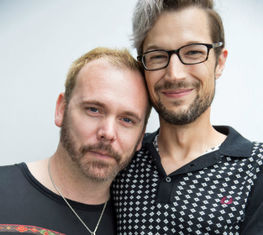 I was incensed this morning when I stumbled on an editorial in the Washington Post by the baker in the Masterpiece Cakeshop case, Jack Phillips, in which Phillips grossly mischaracterizes what the case is legally about. Here are the facts. Charlie and David (pictured left) lived in Colorado. They got engaged in 2011, before gay marriage was legal throughout the U.S. Since it wasn’t legal in Colorado, their plan was to fly to Massachusetts, get married there (where it was legal), and fly back to Colorado to have their reception. They hired a planner to help them with the reception, and the planner told them them that Masterpiece Cakeshop made great cakes. Charlie’s mom was visiting from Wyoming to help with wedding planning, and the three of them went to Masterpiece Cakeshop. They sat down and Jack Phillips, who was working that day, looked up and said, “Hi, who’s the cake for?” Charlie and David said, “It’s for us.” And Phillips said, “I don’t make cakes for same-sex weddings.” The couple was mortified—especially Charlie, since it happened in front of his mom. They filed a complaint with the Colorado Civil Rights Commission that their civil rights had been violated. The Commission agreed, and the Colorado courts ruled in favor of Charlie and David, too. Phillips appealed to the Supreme Court, arguing that he shouldn’t have to make a cake for a gay couple because it violated his religious belief that gay marriage was morally wrong. He said Colorado was forcing him to choose between his livelihood and his moral beliefs.
Yes, Phillips has a right to religious freedom. But this case is not about religious freedom. Phillips writes that although he would have sold Charlie and David anything else in the shop, he "couldn't design a custom cake to celebrate their same-sex marriage." This makes it sound as if they asked him to put their names on the cake, or to top it with a pair of smiling grooms. But they didn't--and if they had, it would be a very different case. Instead, they asked for a cake--a cake without any speech on it at all. It is difficult to argue that something becomes "speech" simply because you know it's going to be used for a particular purpose. Phillips was not forced to say anything or write anything that went against his religious beliefs. He writes that if the Supreme Court rules against him, it will "banish his beliefs" from the marketplace. But this completely misunderstands the legal issue. Phillips opened a business to the public. Under Colorado law, you don't get to do that and then decide that you won't sell your product to certain of its members. Suppose a toy store owner wouldn't sell toys to mixed-race kids because the idea of miscegenation went against his religious beliefs? The case was argued in front of the U.S. Supreme Court in December of last year, and it will be handed down any day now--possibly as soon as Monday. From the oral argument, it was hard to figure out which way the justices were leaning. They spent a lot of time talking about freedom of expression, and whether the mere act of baking a cake was “artistic expression.” If so, it would weigh in favor of protecting Phillips' right not to "express" something he disagreed with. It would also open the door for claims that, for example, a chef doesn't want to make a salad for a same-sex couple celebrating their anniversary. It's easy, in this era of gay marriage and "Will and Grace" reboots to start thinking that progress is inevitable. The fact that Masterpiece Cakeshop is before the Supreme Court--and that someone like Phillips is making these kinds of claims--underscores that we still have an awful lot of work to do. Here's a great podcast on the topic if you want to delve a little deeper.
0 Comments
Your comment will be posted after it is approved.
Leave a Reply. |
|

 RSS Feed
RSS Feed